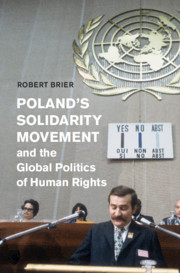Book contents
- Poland’s Solidarity Movement and the Global Politics of Human Rights
- Human Rights in History
- Poland’s Solidarity Movement and the Global Politics of Human Rights
- Copyright page
- Dedication
- Contents
- Acknowledgments
- Note on Geographical Regions
- Note on Cited Primary Documents
- Abbreviations
- Introduction
- 1 The Rise of Dissent in Poland
- 2 Dissent and the Politics of Human Rights
- 3 The Principle of Noninterference as Laid Down in the Helsinki Final Act
- 4 The End of the Ideological Age
- 5 Solidarity, Human Rights, and Anti-Totalitarianism in France
- 6 The “Bedrock of Human Rights”
- 7 Letters from Prison
- 8 Lech Wałęsa, the Symbolism of the Nobel Peace Prize, and Global Human Rights Culture
- 9 General Pinochecki
- 10 Human Rights and the End of the Cold War
- Epilogue
- Bibliography
- Index
6 - The “Bedrock of Human Rights”
US Labor, Neoconservatism, and Human Rights
Published online by Cambridge University Press: 28 May 2021
- Poland’s Solidarity Movement and the Global Politics of Human Rights
- Human Rights in History
- Poland’s Solidarity Movement and the Global Politics of Human Rights
- Copyright page
- Dedication
- Contents
- Acknowledgments
- Note on Geographical Regions
- Note on Cited Primary Documents
- Abbreviations
- Introduction
- 1 The Rise of Dissent in Poland
- 2 Dissent and the Politics of Human Rights
- 3 The Principle of Noninterference as Laid Down in the Helsinki Final Act
- 4 The End of the Ideological Age
- 5 Solidarity, Human Rights, and Anti-Totalitarianism in France
- 6 The “Bedrock of Human Rights”
- 7 Letters from Prison
- 8 Lech Wałęsa, the Symbolism of the Nobel Peace Prize, and Global Human Rights Culture
- 9 General Pinochecki
- 10 Human Rights and the End of the Cold War
- Epilogue
- Bibliography
- Index
Summary
This chapter focuses on the strong support Poland’s Solidarity movement received from the USA’s largest trade union, the AFL-CIO. At least partly, this chapter shows, the AFL-CIO’s strong advocacy for Solidarity has to be seen within US political debates triggered by the election of Ronald Reagan. In Reagan’s rhetoric, Communist totalitarianism came to denote only the most extreme form of the general threat of the modern state to silently encroach on the lives of individuals. Even as he revived the ideological Cold War, Reagan went on to reshape the social imagery underpinning it – a change that entailed curbing the power of organized labor. Against this background, Solidarity fascinated the AFL-CIO not primarily as an anti-Communist movement, but as a trade union. As Reagan reduced the influence of trade unions, the AFL-CIO invoked Solidarity to argue that it was not human rights as such that expressed the difference between East and West, but a particular human right – freedom of association. In the United States, the chapter demonstrates, Solidarity became a contested icon in a political and intellectual struggle initiated not by different foreign policy aims – in this field, the AFL-CIO agreed with Reagan – but by a reconfiguration of the normative and conceptual world of US politics.
Keywords
- Type
- Chapter
- Information
- Publisher: Cambridge University PressPrint publication year: 2021

